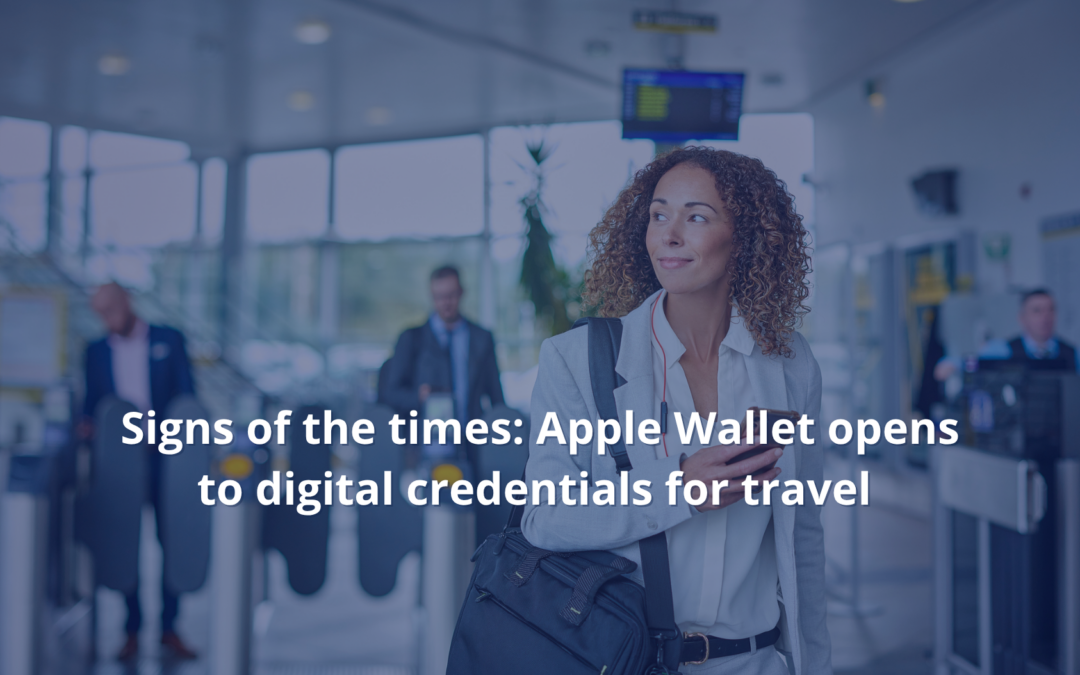A big step for travel, a giant step for digital credentials: Apple will enable the mdoc credential format in its next software release for identity authentication in domestic US travel. With the aviation and travel sectors embracing multiple forms of decentralized identity and verifiable credentials for interoperable global travel, there’s little doubt that the transformation of digital identity is under way.
By Trevor Butterworth
In a signal that digital credentials are going to be the norm for travel and authentication in the near future, Apple announced a WWDC25, its annual Worldwide Developers Conference,, that the upcoming version of its iOS 26 software will allow a person to derive a digital credential from their passport using the mdoc credential format and store it in their Apple Wallets to prove their identity for domestic travel in the U.S.
In a second, related announcement on its developer page, Apple announced the availability of an Apple Identity Document Provider API, which allows websites to receive presentations of mdoc-based documents as a way to authenticate identity.
While not the headline news at WWDC25, these developments represent a significant move forward in the global adoption of seamless, secure, and privacy-preserving digital identity and authentication.
For now, Apple has confined itself to credentials based on the the mdoc (mobile document) standard — ISO18013-5 — which is typically used for mobile driver’s licences (mDL).
The global aviation sector is currently focused on credential formats and protocols that enable international travel and interoperability between the European Union digital identity specifications and the rest of the world.
As of now, Apple’s digital wallets do not offer full support for Europe’s digital identity and wallet specifications (e.g., support for OID4VC and SD-JWT VC is not yet included) and do not appear to utilize the full International Civil Aviation Organization’s Digital Travel Credential (DTC) specifications, which establish global standards for creating digital passports.
Because Apple is deriving credentials from existing physical IDs, this also means that the Apple Wallet announcement doesn’t apply to government-issued digital passports based on an upcoming global standard — DTC Type 2 Credentials — which Indicio is working on through its global partnership with SITA as part of the European Union’s Aptitude Trial.
Yet Apple’s experience in successfully implementing new technology and its skill at delivering effortless user experience is a “lift-all-boats” moment, as it will catalyze the administrative and infrastructural transformation needed for the successful global adoption of verifiable credential technology.
An incremental approach makes sense. The big wallet providers like Apple and Google will learn from the furious pace of innovation around verifiable credentials in the global aviation sector with all the sector and government specific operational and regulatory requirements.
One observation from Indicio’s role in this innovation race: As different countries and geographic regions have already adopted different specifications, interoperability and governance will be the key to usability and seamless travel.
This announcement shows we are all headed toward the same goal — seamless, secure, digital interaction using digital credentials — and that is going to benefit everyone.
Indicio, digital credentials, and travel
As a global market leader in verifiable digital credentials for travel, finance, education, government services, and logistics, Indicio’s decentralized identity solution — Indicio Proven — enables customers to choose from credential representations including mdoc/mDL, ensuring compatibility with Apple, along with SD-JWT VCs, W3C Verifiable Credentials, AnonCreds, Open Badges 3.0, and protocols including DIDComm and OID4VC so that they can best meet their use case and regulatory or geographic requirements.
The variety of use cases for digital credentials means that the future (which is already here) is one where different credentials are used for different purposes but can also interoperate and be combined for maximum flexibility. Indicio recently showed in a trial with Delta Air Lines that multiple credential formats can be used in a seamless workflow for international travel. Our goal is to enable trusted identity and data to go from anywhere to everywhere in the world with travelers consent.
To find out which credential supports your use case best or how to leverage interoperability between credential formats, contact us here.
For more information on the applications, benefits, and limitations of the mdoc/mDL credential format, see this recent Indicio explainer.






